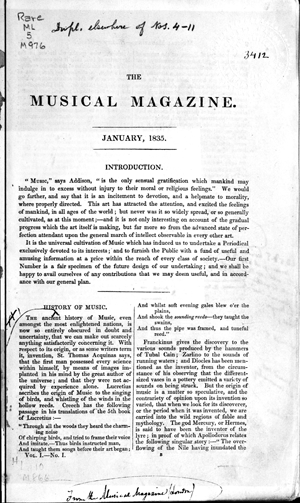The Musical Magazine
Prepared by Liesbeth Hoedemaeker
Introduction by Richard Kitson
Online only (2018)

Twelve issues of the English monthly periodical The Musical Magazine appeared in 1835, giving a wide view of English musical life in the period immediately before Victoria’s ascension to the British throne in 1837. The first editor was John T. Valentine, author of “Practical Harmony Simplified,” serialized in the journal (and continued after Valentine’s position was concluded with issue no. 9), and a composer of songs. The name of the editor for the last three issues is not given. Each issue contains sixteen two-column pages. The page numbering system is continuous from the first to the last issue. Typical of British publications of the period, governed by law, the majority of the articles and reviews and unsigned, or signed with an initial or a pseudonym.
Each issue begins with correspondence, addressed to the editor by knowledgeable writers, signed only with initials or pseudonyms. The topics of these letters encompass important issues of the day: among them, the neglect of performances of compositions by British composers and the prejudice of the British public against compositions by native composers, press reactions to the activities of the Society of British Musicians, the decline of music in the cathedrals, a complaint about the trivial style of recent piano compositions, and the exorbitant sums paid to foreign musician performing in England. These letters are followed by several articles dealing with a variety of topics: articles in series format include the history of music, the aforementioned practical harmony simplified, the rudiments of singing, and the reminiscences of a musical amateur and remarks on song writing. Sketches of the lives of celebrated musicians include those of many musicians and composers active before the London public: the bass operatic singer Luigi Lablache, the pianist and composer Moscheles, the double bass player Dragonetti , the composers Zingarelli, Corelli and Benedetto Marcello, and biographies of Beethoven and Rossini. The tragic death of Vincenzo Bellini is treated under the heading "Last illness and funeral of Bellini." General information about musicians in the British Isles, Europe and North America appears under titles such as “Musical Chit-chat,” “Foreign musical report” and “Anecdotes of music and musicians.”
Reviews of musical performances of concerts and operas are many and deal with the activities of the Covent Garden, Drury Lane theatres, the Surrey and Olympic theatres, the English Opera House, the Hanover Square Concert Rooms, the King’s Concert Rooms, the Royal Gardens at Vauxhall, the New Grecian Saloon, and the Beulah Spa at Norwood. Concerts given by musical institutions include the Sacred Harmonic Society, the Royal Society of British Musicians, the Philharmonic Society, the Società Armonica, the Royal Academy of Music, the Choral Harmonists, the Cecilian Society and the Mary-le-Bone Literary and Scientific Institution. The fourth York Grand Musical Festival and the one-hundred-and-twelfth Gloucester Festival of the Three Choirs are given considerable space for their many morning and evening concerts of the 1835 events. Reviews of published music are also extensive and provide discussion of music popular in this period: songs, piano compositions, choral and religious music and some orchestral music.
Twenty-two individual musical supplements were supplied for the issues, but were given consecutive page numbers 1 through 79, independent of the page numbers of the actual issues. Such a secondary consecutive page numbering system indicates the compositions were also intended for publication as an independent volume of popular music for voice and piano or pianoforte solo. Some of the composers are notable British musicians of the period including John Barnett, George Crouch and C. H. Purday. Three compositions are arrangements of Beethoven’s works: the Andante from the Kreutzer Sonata, the March from Fidelio, and an “Introduction and Waltz composed by Beethoven but never published before.”
